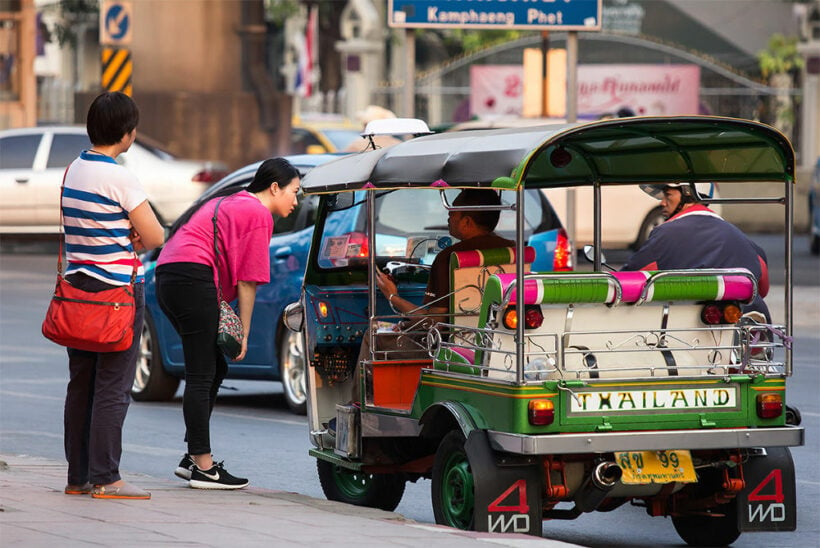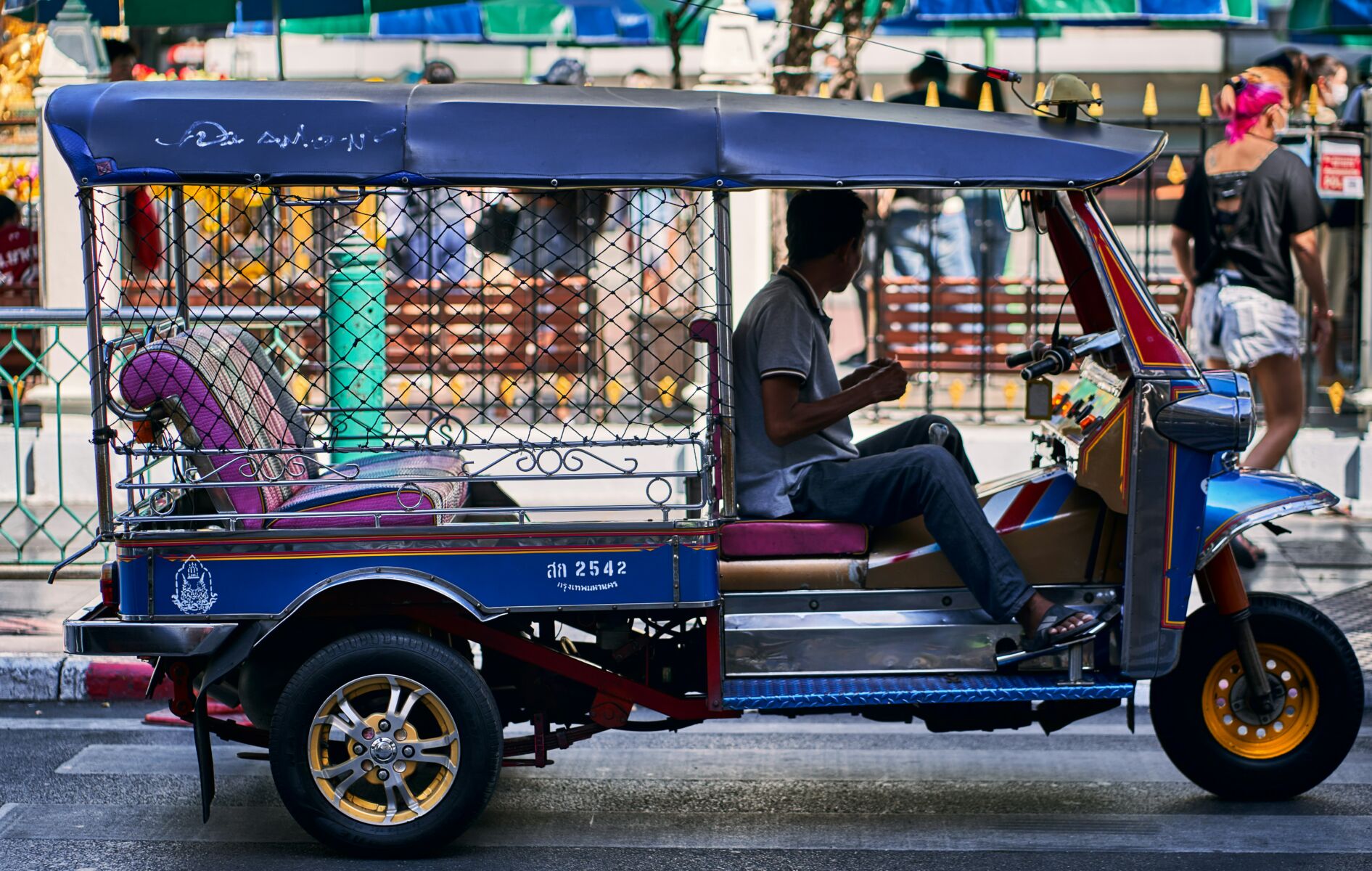Top 10 scams in Thailand

Any hot tourist spot around the world is going to attract the ‘wrong sort of’ people, sometimes greedy locals, who will be specialists at extracting dollars from tourists’ pockets. In Thailand, the main difference is that they will usually do it with a smile. There are indeed scams awaiting tourists who come to Thailand and you are best served by spending a few minutes reading articles like this and saving yourself a lot of financial pain, inconvenience or even a trip to the hospital. Some could even see you end up in jail too.
This is by no means a definitive list of scams but these are, at least, ten popular scams that you will have to negotiate if you travel around, or live in Thailand. In all cases, a bit of homework beforehand will save you from being tricked during your holiday. Here are The Thaiger’s Top 10 Scams in Thailand.
1. The jewellery scam
Although not as common as it used to be, jewellery stores in Thailand seem to exist for one purpose, taking money from tourists as part of one of the oldest scams in the Land of Smiles. Of course, there are reputable jewellery and gem stores but you can usually source them and their prices online before you arrive.
If your driver taxi or tuk tuk offers to take you to a jewellery store just be firm, but polite, and refuse their generous offer. If you actually do want to buy jewellery, don’t go to the stores they recommend. The concept of the jewellery scam could also be used with the local ‘export centre’, ‘factory outlet store’ or ‘I have a friend who has a shop’.
2. Tuk Tuks and taxis
The Tuk Tuk is different things in different parts of Thailand. In Bangkok the three wheeled tourist tuk tuks are no so much a scam, rather just expensive. But as part of the fabric of Bangkok’s tourist machine they’re worthy of at least ride. Most of this section is about the Phuket Tuk Tuk and taxi scams.
Phuket’s Tuk Tuks are common (usually red), three cylinder Daihatsu open mini-vans that are completely the wrong design for having to drive over Phuket’s many steep hills. Somehow they stutter and creep their way over the hills. If you ever thought things in Thailand were cheap, using a tuk tuk or local taxi will quickly change your mind. Even a short journey from one end of Patong to the other is going to cost you 200 baht+, usually more.

Most taxis do meters but they never seem to work, taxis that do have meters are frequently ‘turbo-charged’ so they tick over much faster than they’re meant to, especially the taxis from the airport. Doing town to town journeys will cost you 500 baht+. Going to the airport from Patong is going to cost you 600 baht+. There will be no shortage of shouts of ‘taxi’ as you emerge from the arrivals area at Phuket Airport. If you do want a taxi, head to the Taxi counter, at least here it’s semi-organised although no-less expensive.
Or get your hotel to organise a pick-up for you – someone will be waiting for you with your name on a sign. The taxi and tuk tuk services in Phuket are not technically a scam – more of a minor case of extortion. Most of the time the drivers know where they’re going and are polite and friendly enough
3. The ‘attraction’s closed’ scam
You roll up to any well-known attraction and, before you can get to the gate, a friendly, affable local will kindly inform you that the attraction is closed. This may be despite long queues waiting to get in or the fact that your hotel and taxi driver already informed you that the attraction is open. If you know, for a fact, that the venue is open politely thank them for their advice and that you’re just going to check for yourself. Smile and say goodbye.

How to avoid the ‘attraction’s closed scam
- Confirm Opening Hours in Advance
Before heading out, confirm the attraction’s opening hours using reliable sources like Google, TripAdvisor, or the official website. Many hotels also provide accurate information about local attractions, so it’s worth double-checking with your accommodation. - Politely Decline Unsolicited Advice
If someone approaches you claiming that the attraction is closed, politely thank them but continue toward the entrance to check for yourself. A simple “Thank you, I’ll just check for myself” can save you from getting drawn into a scam. Smile, remain polite, and move on. - Trust Your Original Plan
If your hotel or taxi driver has already informed you that the attraction is open, trust the information you’ve received. Scammers rely on uncertainty and hesitation to lure tourists into a conversation, so sticking to your original plan is key.
If you do end up in a conversation with them you’ll be advised about an alternative attraction that is older, bigger, more spectacular and ‘very close by’ (which usually means 30 minutes away). On the way to this completely unheard-of attraction, you’ll be taken to jewellery stores and markets and offered any number of ‘real’ bargains – a guarantee that you’re paying well over the market price, plus commission. If you do ever get to the ‘alternative’ attraction you’ll be paying them the entrance fee, magically about twice the entrance fee you see on the gate. Plan your day’s trips, check Google, TripAdvisor and ask your hotel for advice.
4. Adult shows

Those ping pong shows your friends have told you about? Yes, they’re real. (For the younger people reading here, the ping pong shows are excellent displays of table tennis skills). So you’re walking down Bangla Road in Phuket, Walking Street in Pattaya or Patpong in Bangkok. You will be approached by ten, twenty… more, people with cards and the big sales pitch “Sexy Girl”.
Once baited, you’ll be taken to a seedy, dark, usually upstairs venue. Downstairs the drinks are at set prices. In these dodgy upstairs venues, the prices are ‘variable’. You will indeed see a show, probably a lot briefer and less explicit than you imagined, and also asked to buy the girls a few drinks. Then you’ll be ‘invited’ to pay large tips to the performers. And if you DO get invited to a ping-pong show you won’t need to take your own table tennis paddle.
5. The jet ski rental scam

You’ve never ridden on a jet ski? No problem. You don’t need a license or any of that nonsense. Just pay the guys and GO. The jet skis are easy enough to ride and, most of the time, you’ll have plenty of fun. But the smile will be taken off your face as soon as you get back to the beach and a cursory inspection from the previously-helpful staff turns into accusations of damage to their jet ski.
It could be a simple scratch to a huge gouge and it’s going to cost you 10,000, 20,000…. more, to get it fixed. No contract, no insurance. It’s a scam. Most of the time the situation can get very heated and a group of intimidating jet ski owners will gather around and harass you.
A few guidelines if you insist on renting a jet ski.
- Inspect the jet ski with the owner and take photos before you pay over your money. If there are marks take photos and point them out to the owner.
- Ask them if there is insurance coverage or a contract. If not, walk away. By law, they’re required to cover you with basic insurance (which may or may not be a valid contract anyway).
- If you do get into a situation where they are demanding money from you beyond what you agreed for rental get a tourist police officer on the spot ASAP, not the local boys-in-brown, a tourist police officer who will usually be dressed in a white shirt with black pants.
- Whatever you do, DO NOT hand over your passport for any reason at any time! Never.
6. Charity Scam

In popular tourist areas, you may come across individuals or groups soliciting donations, often under the guise of raising funds for charity or urgent medical needs. The charity scam typically involves individuals approaching tourists or expats with a request for donations to support a seemingly worthy cause. They may claim to be collecting for a local charity, disaster relief efforts, or even urgent medical treatments for someone in need.
How to Avoid the Charity Scam
- Verify the Charity
Before donating to any cause, it’s essential to verify the legitimacy of the charity. If someone approaches you on the street, ask for the name of the organization and do some research online. Reputable charities will have websites or official listings where you can check their credentials. If you can’t find any information, it’s best not to donate. - Be Wary of Emotional Appeals
Scammers often use emotional stories to pressure tourists into making impulsive donations. While it’s natural to want to help, take a moment to step back and assess the situation. Legitimate charities rarely rely on high-pressure tactics, so if you feel rushed or manipulated, it’s a red flag. - Ask for Identification
If someone claims to represent a charity, ask to see their official identification or charity documentation. Reputable organizations will provide clear proof of their legitimacy, including contact information and registration numbers. If the person cannot provide proper documentation, it’s likely a scam. - Avoid On-the-Spot Donations
If you’re approached for a donation on the street or in a public area, avoid giving cash on the spot. Instead, ask how you can donate directly through the charity’s official website or office. This gives you time to verify the cause and ensures your donation goes to the right place. - Be Cautious of Medical Appeals
Medical scams are common, with individuals showing fake photos or documents of someone in need of urgent treatment. While it’s heartbreaking to hear these stories, it’s important to verify their authenticity. Check whether the hospital or clinic they claim to be associated with is real, and contact them directly if necessary
7. The fake consulate scam

When crossing the border from Thailand to Cambodia, or even other nearby countries, tourists and expats often fall victim to a common scam involving fake consulates. This scam typically unfolds when you’re en route to the border for a visa run or to renew your visa. As you near the border, you’ll likely pass signs advertising a “Cambodian Consulate” or other official-sounding government offices. Your driver may stop in front of a large, official-looking building where friendly and seemingly helpful individuals offer to assist you with your visa.
The service might seem convenient and quick, but there’s a catch—these “visas” are often provided for a hefty fee. Worse yet, they are usually not valid.
How to Avoid the Fake Consulate Scam
- Research Before You Travel
The most important step to avoiding this scam is to do your homework before you travel. Research the legitimate consulate locations and their procedures ahead of time. - Use Trusted Transport
When crossing borders, it’s best to use reputable transport services or organized tours. Some taxi or tuk-tuk drivers are involved in the scam, taking passengers to fake consulates. - Check Official Websites
Always check the official embassy or consulate website for information about visa requirements, fees, and office locations.
The danger in this situation is when you merrily head back to wherever you were staying and then end up in all sorts of trouble when you depart the country through a proper immigration channel and find you’ve overstayed your visa. Do your homework before you head to a border for a visa run and know where the consulates are so you don’t fall for this scam.
8. Time Shares
The timeshare scam is different from the legitimate timeshare schemes offered around Thailand. But here are some things to check before you sign up for ANYTHING. Do not sign a document in Thailand until you’ve consulted a proper Thai lawyer. The timeshare’theory’ is that you’ll become a member of a larger group of people owning a share of a ‘title’ in a property or yacht.
Usually, foreign backpackers end up as the ones in the street politely stopping you and asking you to pick a card with the promise of a prize. Amazingly you always pick the card with the prize which is a free visit to a nearby, or sometimes not nearby, resort or showroom – no obligation of course – where you will be courted with the ‘financial opportunities’ and ‘convenience’ of timeshare.
How to avoid time share scams
- Be Skeptical of Random Prize Offers
If someone on the street approaches you with a “lucky” card or promises of a free prize, it’s best to be sceptical. The card-picking trick is just a tactic to get you into a high-pressure sales environment where you’ll be pitched a time-share. - Ask If It’s a Time-Share
One of the simplest ways to avoid falling into the trap is to directly ask the person, “Is this a time-share offer?” If the answer is yes, politely decline and move on. Time-share offers often come with heavy-handed sales tactics, and it’s best to avoid them altogether. - Don’t Feel Obligated to Attend
Even though they may say there’s no obligation to buy, just attending the presentation can subject you to hours of intense sales pressure. It’s not worth the time, especially when you could be enjoying your holiday.
99% of the time it’s just heavy-handed sales and you could have spent the three hours on the beach or browsing the shops instead. If you encounter something like this just ask if it’s a time-share offer and then walk on by.
9. Bar girls
If a charming young woman in hot pants and high heels approaches you on the street, inviting you to her bar, it’s best to keep walking. Sure, if you’re a single guy, It might feel flattering, but it’s essential to be cautious as this could be part of a common scam targeting tourists. Here’s what you need to know about the bar scam and how to avoid it.

The situation typically unfolds when a young woman in revealing clothing approaches you on the street, often near popular nightlife areas. She’ll strike up a conversation and invite you to her bar for a few drinks. For some, this may sound like a harmless and enjoyable night out, but here’s what usually happens.
- Overpriced Drinks
Once you’re inside the bar, the prices for drinks will likely be far higher than expected. The woman may encourage you to buy a round for both of you, including expensive drinks for herself, all while appearing to have a friendly chat. - Disappearing Act
After a couple of drinks, the woman will often make a sudden exit, leaving you with a large, inflated bill to settle. In some cases, she may be replaced by a less welcoming bar owner or staff member who insists you pay the bill immediately.
How to Avoid the Bar Scam
- Be Skeptical of Random Invitations
If an attractive stranger suddenly invites you to a bar, especially in tourist-heavy areas, it’s wise to be cautious. While it might feel flattering, it’s often part of a setup to lure you into overpriced venues. - Stick to Well-Known Establishments
To avoid falling victim to this scam, it’s best to stick to reputable, well-known bars and nightlife spots. Do some research before heading out or ask for recommendations from trusted sources like your hotel or fellow travellers. - Politely Decline Invitations
If you’re approached by someone offering to take you to a bar, the safest approach is to politely decline. Saying “No, thank you” and continuing on your way can save you from getting caught up in the scam. - Check Drink Prices Before Ordering
If you do find yourself in a bar with someone who has invited you, always check the drink prices before placing an order. This will help you avoid any surprises when the bill arrives. If the prices aren’t clear or the staff are evasive, it’s a red flag.
Whether it’s a scam or just aggressive marketing, one thing’s for sure—you’ll end up paying a lot more than you expected. And let’s be honest, if you’re 65, out of shape, haven’t shaved in days, and wearing a dated floral shirt, it’s unlikely that a young woman is genuinely interested in sharing a drink with you.
10. The Tailor Scam
When exploring the bustling streets of Thailand, you may encounter friendly locals or tuk-tuk drivers suggesting you visit a tailor. The tailor scam is a common scheme targeting tourists, but with a bit of knowledge, you can avoid falling for it.

The typical scenario begins when your taxi or tuk-tuk driver makes an unexpected stop, often claiming they need to take a bathroom break. During this stop, a seemingly friendly individual approaches you, initiating conversation with a simple, “Where are you from?” It’s a common tactic used to engage tourists in conversation, and from there, the pitch starts.
The person will tell you about an amazing tailor they know, one that supposedly offers incredible deals on suits that rival high-end brands like Armani. They will try to convince you that this is a unique opportunity to get a bespoke suit for a fraction of the price.
The truth is, you’re not talking to someone genuinely interested in helping you; you’re dealing with a middleman. This person, or sometimes even the driver themselves, receives a commission from the tailor for bringing customers. By the time you’re measured for your “custom suit,” you’ve already entered into an overpriced deal.
How to Avoid the Tailor Scam
- Beware of Unsolicited Recommendations
If someone randomly approaches you with a recommendation for a tailor, be cautious. Whether it’s a friendly stranger or your tuk-tuk driver, remember that these individuals are often motivated by commissions, not by genuine helpfulness. - Politely Decline Offers
When approached with unsolicited offers, it’s best to politely but firmly decline. Saying something like, “No, thank you,” and continuing on your way can help you avoid getting caught up in the scam. - Don’t Feel Pressured by Tuk-Tuk or Taxi Drivers
Some tuk-tuk or taxi drivers may try to steer you toward specific tailors or shops, claiming you’ll get a great deal. Remember, drivers often receive a commission for bringing you to these places. If a driver insists on stopping at a tailor, ask to go directly to your destination, or consider finding another ride. - Check the Tailor’s Reputation
Before committing to any purchase, check online reviews or check out our trusted tailors. A reputable tailor will have positive reviews from satisfied customers. Be cautious if you can’t find any information about the tailor or if the reviews are mixed. - Say You’re from Thailand
When asked, “Where are you from?” as part of the scam, a clever response is to simply say, “Thailand.” This can catch the scammer off guard, giving you time to walk away without getting into a conversation.
By understanding how this common scam works, you’ll be better prepared to enjoy Thailand’s incredible offerings without falling victim to overpriced or low-quality tailoring services. Stay aware, and stick to trusted recommendations, and you’ll have a much more enjoyable experience.
Latest Thailand News
Follow The Thaiger on Google News:


























